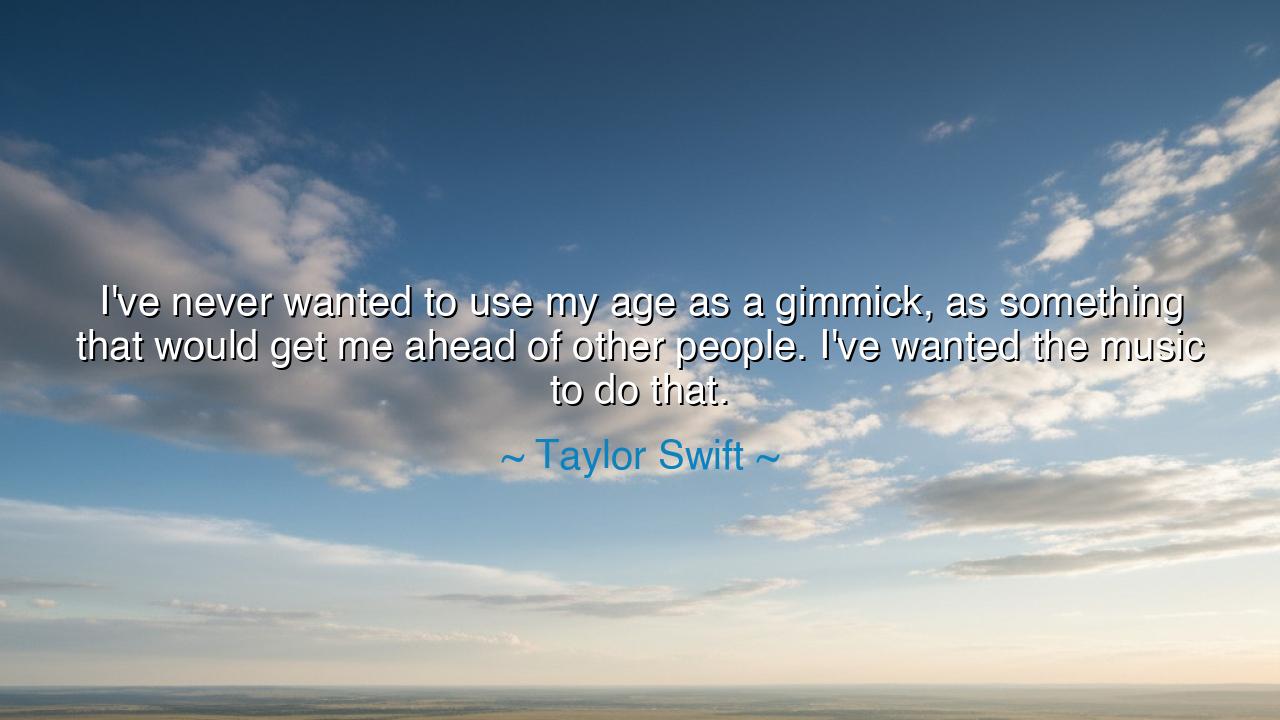
I've never wanted to use my age as a gimmick, as something that
I've never wanted to use my age as a gimmick, as something that would get me ahead of other people. I've wanted the music to do that.






In the course of human existence, there are many temptations that seek to shape us, to push us into molds that promise success but often come at the expense of our authenticity. Taylor Swift, a figure whose rise to fame has captivated millions, offers a poignant insight into this struggle when she says, "I've never wanted to use my age as a gimmick, as something that would get me ahead of other people. I've wanted the music to do that." In these words, she draws a line between authenticity and exploitation, choosing not to allow the superficial elements of her life to define her but instead to let the depth of her craft—the music—speak for itself.
The ancients understood the power of authenticity and the danger of using one's position for fleeting advantage. Socrates, for instance, did not seek to gain followers through his wealth or status; rather, he spoke from the depths of his wisdom. His fame arose not from his position in society but from the truths he revealed about the human experience. Socrates was not concerned with impressing others or using his age or reputation as a stepping stone. His focus was on seeking wisdom and urging others to do the same. Similarly, Swift's decision not to rely on the superficial aspects of her life, such as her youth, reflects a deeper commitment to the integrity of her work and the idea that true merit and lasting influence arise from substance, not image.
Consider the example of Leonardo da Vinci, whose brilliance was not confined to his age but to his unyielding pursuit of knowledge and mastery. Though young when he began his career, it was not his youth but his vision and his artistry that allowed him to leave a legacy that endures to this day. Da Vinci’s genius lay in his relentless commitment to his craft, not in using his age or his status as a means of gaining favor or recognition. Just as da Vinci transcended his own youth to become an icon of intellectual and artistic greatness, Swift similarly chooses to let her music, her talent, and her creative vision speak louder than any external factor.
Moreover, there is a powerful lesson embedded in Swift’s words about the nature of fame and achievement. The ancients spoke of virtue as the true source of greatness. For example, Aristotle taught that the pursuit of virtue and excellence was the path to happiness and fulfillment. True success, he believed, could not be gained through superficial means, but through a deep commitment to one's purpose and the cultivation of virtue. Swift's choice to let her music and not her age define her is an embodiment of this ancient wisdom. In a world where instant gratification and quick fixes are often celebrated, she understands that lasting greatness comes from a deeper commitment to the craft itself.
In the history of famous creators, we see time and again that true influence is not won through the exploitation of factors outside of one’s control—whether it be age, beauty, or status. Consider Maya Angelou, whose powerful words were not merely the product of her experience but of her insight, wisdom, and humanity. Angelou didn’t rely on the mere fact of her age or the circumstances of her life to make an impact. Instead, she crafted her words with purpose and meaning, choosing to let her message resonate beyond the superficial. Similarly, Swift chooses to let her talent and work speak for themselves, ensuring that her influence arises from what she creates rather than what she appears to be.
The lesson here is one that can guide us in all our endeavors: to rely on substance over superficiality, on integrity over appearances. Swift’s decision to allow her music to lead her rather than her age or identity serves as a powerful reminder that true success is born from the commitment to our craft, the depth of our character, and the honesty of our work. Whether we are young or old, rich or poor, our influence in the world depends not on exploiting external factors but on the authenticity and passion with which we pursue our true calling.
In our own lives, let us take a page from Swift's approach and remember that the most lasting achievements come not from using age or appearance to our advantage, but from investing deeply in what we do, cultivating skills, virtue, and a commitment to excellence. Whether in the pursuit of music, art, or any other field, we must strive to let our work define us, rather than the passing factors of time or external perceptions. For, as the ancients taught, the pursuit of virtue and the dedication to our craft will always stand as the truest markers of greatness.






AAdministratorAdministrator
Welcome, honored guests. Please leave a comment, we will respond soon